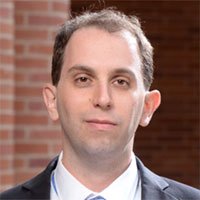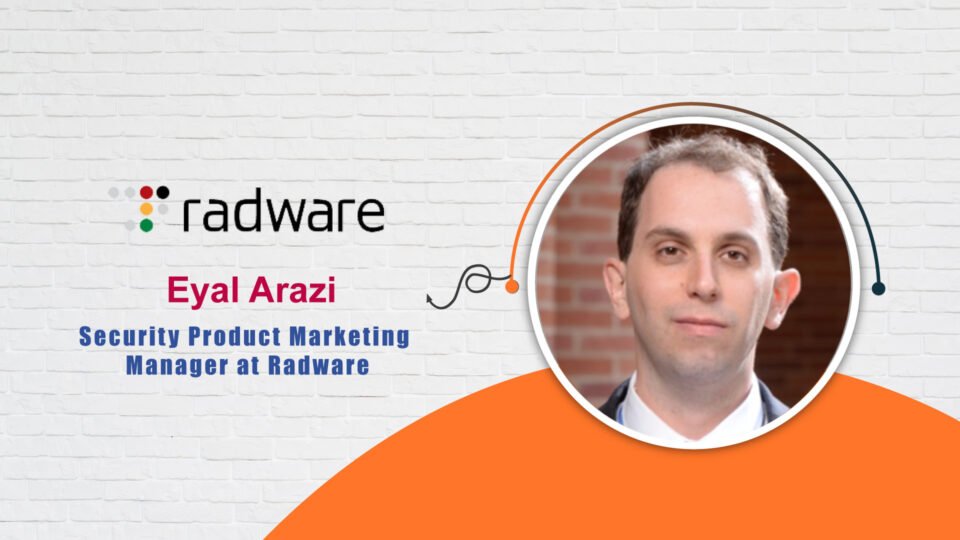Eyal Arazi, Security Product Marketing Manager at Radware discusses the importance of Enterprise cloud security by utilizing the most effective cybersecurity tools.
1. Tell us how you came to be the Security Product Marketing Manager at Radware. What does your role entail?
I started my career more on the technical side, as a Product Manager, and then gradually shifted to product marketing. Product marketing in the security space is more technical than most product marketing roles. You must have a good understanding of computer networks, attack techniques and defense tools.
I am responsible for the high-level messaging for Radware’s cloud security products, developing the value proposition for customers, and creating many of the marketing assets that are used with customers. I not only have a good understanding of how our security products work, but I also understand customer concerns and pain points.
2. What are some of the industrial sectors that Radware caters to?
Radware’s customers include organizations of every size and industry vertical. However, we specifically have deep roots in industry verticals and sectors which hold highly sensitive user data, which they must protect. This includes financial services and banking industry, e-commerce and retail, healthcare, and government sectors.
3. What are the applications or rather opportunities you seek to have with your product?
As a provider of security products and services, our objective is to make sure that our customers’ networks and data are as secure as possible, and never get breached. However, beyond that, our objective is to achieve this in a way that impacts the customer as little as possible, and does not interrupt legitimate users from accessing the protected resources.
4. What are some of the unique lessons you have learnt from analysing your customer behaviour?
It’s all about ‘the job to be done.’ Every organization has its purpose and line of business to achieve. Different people within the organization have a variety of roles and care about different things within the context of their job. So, it’s important for Radware to demonstrate not just how we provide the best protection with our products, but also how those products don’t get in the way of the people or the organization from doing their job. This is why it’s so important to explain the value of the product, not just from a security standpoint, but also as an enabler for their day-to-day job.
5. Radware was recently in the news for being ranked high by Gartner in Critical Capabilities for Cloud Web Application and API Protection Report. Can you elaborate more on the same?
As more and more applications and data are moved to the web, it continues to become more important than ever to protect web applications against exploitation and hacking.In addition, as the usage of publicly-facing APIs is also increasing, it is vital to protect those APIs, as well. Radware provides tools to protect web applications and APIs based on our cloud-based web application firewall. What makes our cloud service unique is that most products on the market today use static, manually configured rules to stop traffic that they know to be malicious, but allow everything else through. Radware uses something called a ‘positive security model’ which uses machine-learning to understand the patterns of legitimate user traffic, and automatically create security policies for them based on these patterns. This allows legitimate traffic to go through, but blocks all traffic which does not conform to the patterns of legitimate user behavior. We use this approach for both web application defense, and API protection. Recently, a study by Gartner, one of the leading analyst firms in the world, ranked Radware #1 for both web application protection for ‘high security’ use cases (i.e., use cases which require advanced protection of very sensitive data), as well as API Protection. Radware was able to achieve this recognition because of its advanced technology, which is based on a positive security model.
6. Radware was recently in the news for partnering with Airtel to offer cloud security services to businesses in India. Can you elaborate more on the same?
As information security is becoming more and more of a concern to many organizations, Radware is also expanding its global footprint and the markets to which it offers its products. As one of the biggest communications companies and service providers in India, Airtel was a natural choice for us as a partner to deliver our cloud products directly in India.
In addition, Airtel will host a new scrubbing center against DDoS attacks directly in India. Because all customer traffic stays directly within India at all times, this partnership will allow Indian customers to better protect themselves, and to ensure that they do it faster, with lower latency, and without having to violate any national or industry security regulations.
7. What are some of the common pain points that your customers commonly approach you with?
One of the key problems in security is the issue of false positives. There are two ways that security tools can fail: the first is by not stopping malicious traffic that should have been stopped (this is known as a ‘false negative’), and the second is by stopping too much traffic, including traffic of legitimate users, who are then prevented from accessing their own data. Each one is detrimental in its own way. False negatives are bad because it means malicious traffic is allowed to reach your applications. And false positives are bad because you lose revenue and brand recognition when legitimate users are unable to access their own websites.
This is a key reason why having a ‘positive’ security model based on AI and machine learning is so important. It allows for better detection and lower rates of false positives.
8. What advice would you like to give to the upcoming Cloud Security tech start-ups?
Focus on explaining the value of your product to customers. It is very easy to focus too much on the technical features of the product and expect that everyone else will understand the technology and how to solve issues. However, it is not enough simply to explain how the technology works. Instead, you must demonstrate to the customer how your product will secure their business and make their daily routines easier.
9. Can you give us a sneak peek into some of the upcoming product upgrades that your customers can look forward to?
We are always looking to enhance the quality of our security portfolio, while ensuring multi-cloud security to provide protection in a consistent, adaptable and platform-agnostic way. And one that can be deployed regardless of where the product resides.
10. How will you encourage tech marketers to choose cloud security tech as their career path?
I would tell them that this is the most interesting industry in the world. Security vendors and hackers always play a game of ‘cat and mouse,’ adapting defenses before hackers come up with new ways around them, and vice-versa. It is a very challenging and complex landscape, and even tech marketers need to have an in-depth understanding of the technology. In this industry, no day is like the one before it and there is always something happening. It’s a very complex, but also a very interesting and rewarding profession.
11. How do you keep pace with the rapidly growing cloud security tech space?
I follow the news closely to see major alerts about new developments, attacks, trends and so on. At Radware, we also have a team of security researchers who track new attack patterns real-time while they are still in the ‘wild.’
12. Which is the one Cloud Security breakthrough you will be on the lookout for in the upcoming year?
To have the Integration of multiple tools into a single product or a single dashboard. Organizations today must protect their applications against multiple threat surfaces. Many organizations are still okay with using point solutions from different providers .
13. What is the one quote that has stayed with you throughout your professional life?
“Everything should be made as simple as possible, but not simpler.” by Albert Einstein.
For more such updates and perspectives around Digital Innovation, IoT, Data Infrastructure, AI & Cybsercurity, go to AI-Techpark.com.
Product marketing in the security space deals with extremely complex topics and it is our responsibility to understand very large, technical concepts and strip them down to the simplest elements, which can be quickly and easily understood by our customers.But at the same time, you also need to make sure that you don’t oversimplify it so that it takes away the core ideas and concepts that you’re trying to convey. I like to think of Einstein’s quote in order to make sure I’m getting the balance right.

Eyal Arazi
Security Product Marketing Manager at Radware
Eyal is the Security Product Marketing Manager in Radware’s security group, responsible for the company’s line of cloud security products, including Cloud WAF, Cloud DDoS, and Cloud Workload Protection Service. Eyal has extensive background in security, having served in the Israel Defense Force (IDF) at an elite technological unit. Prior to joining Radware, Eyal worked in Product Management and Marketing roles at a number of companies in the enterprise computing and security space, both on the small scale startup side, as well as large-scale corporate end, affording him a wide view of the industry. Eyal holds a BA in Management from the Interdisciplinary Center (IDC) Herzliya and a MBA from the UCLA Anderson School of Management.

